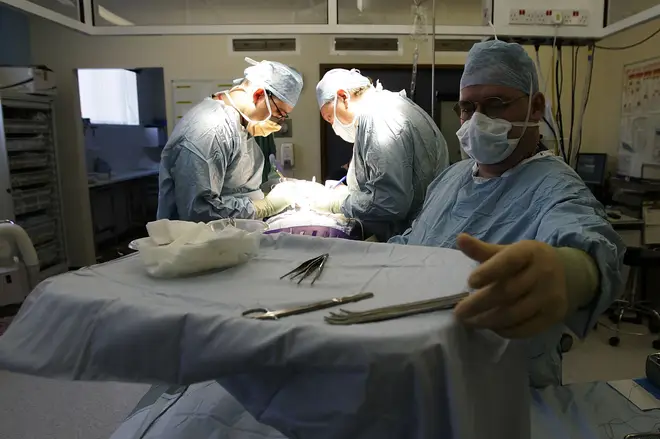
Clive Bull 1am - 4am
26 June 2020, 18:55

Exclusive: transplants have fallen by 40% largely due to coronavirus
The number of transplants taking place in the UK has dropped by more than a third in the first five months of the year, largely due to coronavirus, new figures from NHS Blood and Transplant show.
Based on a monthly average, data shows there were 780 fewer transplants between January and May than might otherwise have been expected, a drop of 37 per cent.
The majority of those were kidney transplants (555) but also included a large number of liver transplants (122) and smaller numbers of pancreas, heart and lung transplants.
The drop was described by an NHS Blood and Transplant source as the result of a “perfect storm” created by COVID-19.
The data, prepared for the Department of Health and Social Care, was partially revealed in response to Parliamentary written question last week, but the full analysis has now been seen by LBC.
On one hand, the virus caused a large number of transplant centres to be closed, to avoid exposing vulnerable patients to infection.

But there has also been a significant drop in the number of potential donors.
Many organs are taken from victims of sudden trauma, often those with brain injuries, frequently as a result of road traffic accidents. Lockdown has significantly reduced the number of accidents, and therefore the availability of donors.
And the impact of this can be devastating for patients on transplant waiting lists.
Despite being in her early thirties, Becky Gough suffers from liver failure, and has been waiting for a new liver for over a year.
She said: “I received a letter saying that I’d be waiting longer for a transplant due to coronavirus, and that I’m not likely to get one any time soon.
“It’s been very, very stressful. It’s had a massive impact on my health. I’m finding things a lot more difficult. It’s caused a lot of worry among my family, my friends and my partner.
Listen & subscribe: Global Player | Apple Podcasts | Google Podcasts | Spotify
“There’s only so long you can live with liver failure.”
Doctors, too, admit that although every effort is being made to ensure that life-saving treatment goes ahead where possible, the disruption to transplant availability inevitably means that some patients will die waiting.
Professor Lorna Marson, a consultant surgeon in Edinburgh and chair of Kidney Research UK’s transplant network said: “We try to transplant patients as early as possible, and preferably before they start kidney dialysis.
"If we transplant patients before they start dialysis we know the long term outcome of those patients and survival is better.
"So during this time some patients will now be on dialysis, and we will have lost that window of opportunity.
“And for other patients with more complications, there are some who are no longer suitable for transplant. A small number of kidney patients do die on the waiting list.”
As the immediate threat of the virus recedes, the number of transplants is now increasing again.
More than half of kidney transplant units have reopened across the UK, and the number of deceased donors is increasing week on week. But we are still far from returning to normality.
Where possible, doctors are finding innovative ways of ensuring transplants can still take place. In London, for instance, private hospitals which have not had the same exposure to coronavirus have been facilitating NHS transplant operations.
But every transplant that doesn’t happen could ultimately be the difference between life and death for a patient like Becky.